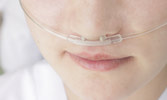Sleep apnea can affect the way you breathe while asleep, which can negatively affect the amount of oxygen your body is receiving. In today’s blog, we will share with you information about how oxygen therapy and sleep apnea are connected. Continue reading to find out more!
What Is Sleep Apnea?
Sleep apnea is a sleep disorder in which breathing repeatedly starts and stops throughout the night. There are three different types of sleep apnea; obstructive sleep apnea, central sleep apnea, and complex sleep apnea.
- Obstructive sleep apnea is where the throat muscles in the back of the throat collapse causing an obstruction in the airway.
- Central sleep apnea is when the brain fails to send the proper signals needed to breathe.
- Complex sleep apnea is a combination of both obstructive and central sleep apnea.
Sleep apnea can negatively affect one’s quality of sleep, and if left untreated, can lead to other health problems including high blood pressure and diabetes.
How Oxygen Levels are Affected
Oxygen levels are negatively affected by sleep apnea because of repeated interruptions in breathing while asleep. Sleep apnea can cause your oxygen levels to drop, leading to hypoxemia. Generally, when a sleep test is conducted, oxygen levels will be recorded, so if there is a significant decrease in oxygen caused by sleep apnea, oxygen therapy may be used.
When Oxygen Therapy Is Used
Oxygen therapy won’t solve all of the problems caused by sleep apnea, but it can be effective in improving oxygen levels and reducing high blood pressure in the morning (caused by sleep apnea). Oxygen therapy won’t reduce the apnea-hypopnea index (the number of apneas and hypopneas that occur each hour of sleep) or reduce daytime fatigue and tiredness.
Oxygen therapy can be beneficial when treating sleep apnea, but your physician will ultimately know if oxygen therapy is right for you. In some cases, oxygen therapy may be counterproductive and could make symptoms worse. It all depends on the severity of your condition and any other health conditions that you have. If oxygen therapy isn’t recommended for you, there are other treatment options available such as positive airway pressure therapy (PAP Therapy) and continuous positive airway pressure (CPAP) treatments.
Find Out How We Can Help
If you are struggling with symptoms of sleep apnea, now is the time to start taking back control of your sleep! Laboratory and home sleep testing can help give you the correct diagnosis as well as provide information about your oxygen saturation levels throughout the night. If you are interested in learning more about our sleep testing services, please contact our team for more information.


